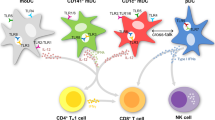Abstract
Generation of large numbers of dendritic cells (DC) for research or immunotherapeutic purposes typically involves in vitro conversion of murine bone marrow precursors or human blood monocytes to DC via cultivation with supraphysiologic concentrations of cytokines such as GM-CSF and IL-4 for up to 7 days. Alternatively, our group has recently established a new approach, based on the underlying mechanism of action of a widely used cancer immunotherapy termed Extracorporeal Photochemotherapy (ECP). Our method of rapid and cytokine-free production of therapeutically relevant DC populations, leveraging the innate physiologic programs likely responsible for DC differentiation from blood monocytes in vivo, potentially offers a novel, inexpensive, and easily accessible source of DC for clinical and research uses. This approach involves ex vivo physiologic reprogramming of blood monocytes to immunologically tunable dendritic antigen-presenting cells, which we term “phDC,” for physiological DC. To facilitate access and utilization of these new DC populations by the research community, in this chapter, we describe the use of a scaled-down version of the clinical ECP leukocyte-treatment device termed the Transimmunization (TI) chamber or plate, suitable for processing both mouse and human samples. We highlight the methodological sequences necessary to isolate mouse or human peripheral blood mononuclear cell (PBMC) from whole blood, and to expose those PBMC to the TI chamber for facilitating monocyte activation and conversion to physiological DC (phDC) through interaction with blood proteins and activated platelets under controlled flow conditions. We then provide sample protocols for potential applications of the generated DC, including their use as vaccinating antigen-presenting cells (APC) in murine in vivo antitumor models, and in human ex vivo T-cell stimulation and antigen cross-presentation assays which mimic clinical vaccination. We additionally highlight the technical aspects of loading mouse or human phDC with tumor-associated antigens (TAA) in the form of peptides or apoptotic tumor cells. We provide a simple and clinically relevant means to reprogram blood monocytes into functional APC, potentially replacing the comparatively expensive and clinically disappointing cytokine-derived DC which have previously dominated the dendritic cell landscape.
Access this chapter
Tax calculation will be finalised at checkout
Purchases are for personal use only
Similar content being viewed by others
References
Raval JS, Ratcliffe NR (2018) Extracorporeal photopheresis and personalized medicine in the 21st century: the future’s so bright! J Clin Apher 33(4):461–463
Edelson RL (2014) Mechanistic insights into extracorporeal photochemotherapy: efficient induction of monocyte-to-dendritic cell maturation. Transfus Apher Sci 50:322–329
Ventura A et al (2018) Extracorporeal photochemotherapy drives monocyte-to-dendritic cell maturation to induce anticancer immunity. Cancer Res 78:4045–4058
Durazzo TS, Tigelaar RE, Filler R, Hayday A, Girardi M, Edelson RL (2014) Induction of monocyte-to-dendritic cell maturation by extracorporeal photochemotherapy: initiation via direct platelet signaling. Transfus Apher Sci 50:370–378
Ventura A, Vassall A, Yurter A, Robinson E, Filler R, Hanlon D, Meeth K, Ezaldein H, Girardi M, Sobolev O, Bosenberg MW, Edelson RL (2019) Novel protocol for generating physiologic immunogenic dendritic cells. J Vis Exp 147. https://doi.org/10.3791/59370
Chauvin JM, Larrieu P, Sarrabayrouse G, Prévost-Blondel A, Lengagne R, Desfrançois J, Labarrière N, Jotereau F (2012) HLA anchor optimization of the melan-A-HLA-A2 epitope within a long peptide is required for efficient cross-priming of human tumor-reactive T cells. J Immunol 188(5):2102–2110
Hong E, Usiskin IM, Bergamaschi C, Hanlon DJ, Edelson RL, Justesen S, Pavlakis GN, Flavell RA, Fahmy TM (2016) Configuration-dependent presentation of multivalent IL-15:IL-15Rα enhances the antigen-specific T cell response and anti-tumor immunity. J Biol Chem 291(17):8931–8950
Kibbi N, Sobolev O, Girardi M, Edelson RL (2016) Induction of anti-tumor CD8 T cell responses by experimental ECP-induced human dendritic antigen presenting cells. Transfusion Apher Sci 55(1):146–152
Johnson LA, Heemskerk B, Powell DJ Jr et al (2006) Gene transfer of tumor-reactive TCR confers both high avidity and tumor reactivity to nonreactive peripheral blood mononuclear cells and tumor-infiltrating lymphocytes. J Immunol 177:6548–6559
Draper L et al (2015) Targeting of HPV-16+ epithelial cancer cells by TCR gene engineered T cells directed against E6. Clin Cancer Res 21(19):4431–4439
Author information
Authors and Affiliations
Corresponding author
Editor information
Editors and Affiliations
Rights and permissions
Copyright information
© 2020 Springer Science+Business Media, LLC, part of Springer Nature
About this protocol
Cite this protocol
Hanlon, D. et al. (2020). Rapid Production of Physiologic Dendritic Cells (phDC) for Immunotherapy. In: Katz, S., Rabinovich, P. (eds) Cell Reprogramming for Immunotherapy. Methods in Molecular Biology, vol 2097. Humana, New York, NY. https://doi.org/10.1007/978-1-0716-0203-4_11
Download citation
DOI: https://doi.org/10.1007/978-1-0716-0203-4_11
Published:
Publisher Name: Humana, New York, NY
Print ISBN: 978-1-0716-0202-7
Online ISBN: 978-1-0716-0203-4
eBook Packages: Springer Protocols




